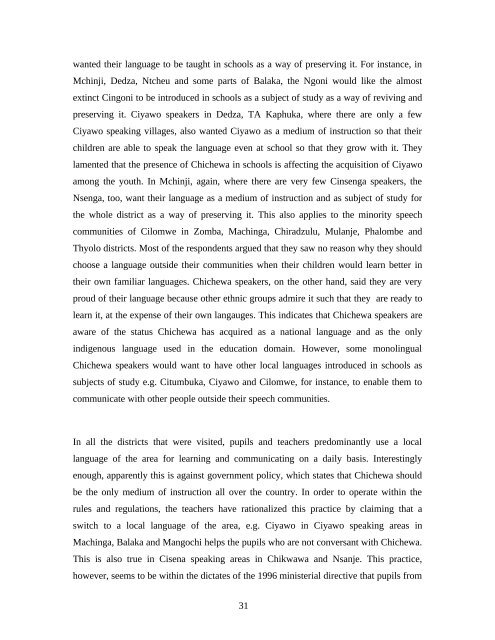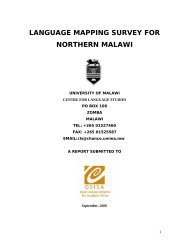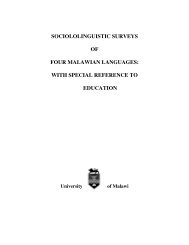Executive Summary - Centre for Language Studies
Executive Summary - Centre for Language Studies
Executive Summary - Centre for Language Studies
You also want an ePaper? Increase the reach of your titles
YUMPU automatically turns print PDFs into web optimized ePapers that Google loves.
wanted their language to be taught in schools as a way of preserving it. For instance, inMchinji, Dedza, Ntcheu and some parts of Balaka, the Ngoni would like the almostextinct Cingoni to be introduced in schools as a subject of study as a way of reviving andpreserving it. Ciyawo speakers in Dedza, TA Kaphuka, where there are only a fewCiyawo speaking villages, also wanted Ciyawo as a medium of instruction so that theirchildren are able to speak the language even at school so that they grow with it. Theylamented that the presence of Chichewa in schools is affecting the acquisition of Ciyawoamong the youth. In Mchinji, again, where there are very few Cinsenga speakers, theNsenga, too, want their language as a medium of instruction and as subject of study <strong>for</strong>the whole district as a way of preserving it. This also applies to the minority speechcommunities of Cilomwe in Zomba, Machinga, Chiradzulu, Mulanje, Phalombe andThyolo districts. Most of the respondents argued that they saw no reason why they shouldchoose a language outside their communities when their children would learn better intheir own familiar languages. Chichewa speakers, on the other hand, said they are veryproud of their language because other ethnic groups admire it such that they are ready tolearn it, at the expense of their own langauges. This indicates that Chichewa speakers areaware of the status Chichewa has acquired as a national language and as the onlyindigenous language used in the education domain. However, some monolingualChichewa speakers would want to have other local languages introduced in schools assubjects of study e.g. Citumbuka, Ciyawo and Cilomwe, <strong>for</strong> instance, to enable them tocommunicate with other people outside their speech communities.In all the districts that were visited, pupils and teachers predominantly use a locallanguage of the area <strong>for</strong> learning and communicating on a daily basis. Interestinglyenough, apparently this is against government policy, which states that Chichewa shouldbe the only medium of instruction all over the country. In order to operate within therules and regulations, the teachers have rationalized this practice by claiming that aswitch to a local language of the area, e.g. Ciyawo in Ciyawo speaking areas inMachinga, Balaka and Mangochi helps the pupils who are not conversant with Chichewa.This is also true in Cisena speaking areas in Chikwawa and Nsanje. This practice,however, seems to be within the dictates of the 1996 ministerial directive that pupils from31





